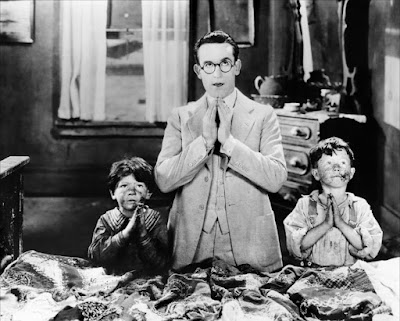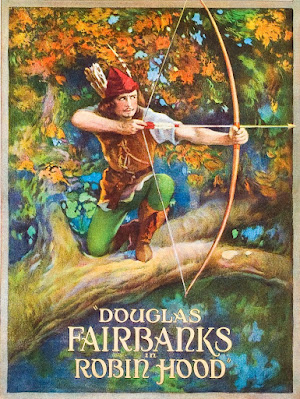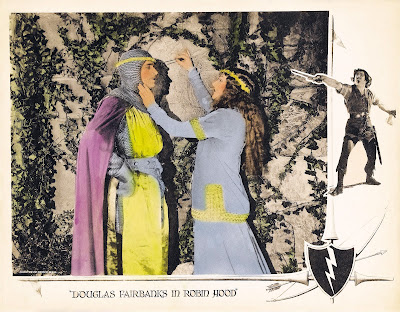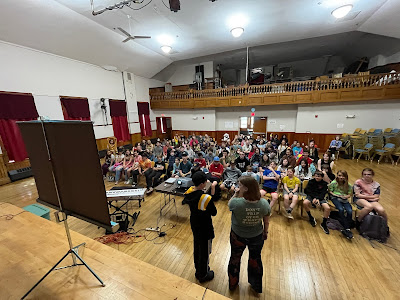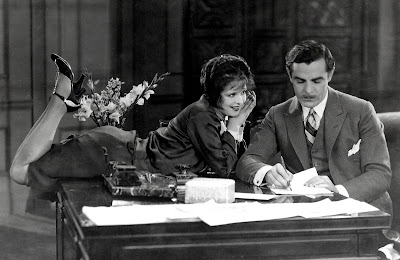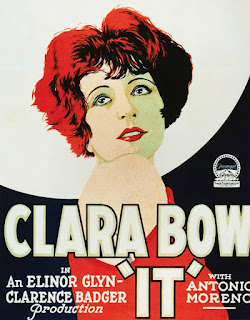Up next on Wednesday, June 29: a 100th anniversary screening of Douglas Fairbanks Sr. in 'Robin Hood' (1922) at the Leavitt Theatre in Ogunquit, Maine.
Details in the press release below. But first, a report from last night's screening of Harold Lloyd's 'The Kid Brother' (1927) at the Coolidge Corner Theatre in Brookline, Mass.
Shown via DCP provided by the Harold Lloyd Trust, to my eyes the film never looked better. Really! Every subtle background detail was rendered perfectly on the big screen in the Coolidge's main auditorium.
All the exquisitely framed views of life in small town America (in the film, Hickoryville) got me thinking: in what year, exactly, is 'The Kid Brother' set?
Jobyna Ralston and Harold Lloyd share the somewhat ambiguous atmosphere in 'The Kid Brother.'I don't think I've ever encountered any solid information about this, and the film itself offers few clues. One thing to note: not a single automobile appears on screen. Does that mean it was in the pre-auto 19th century? But then again, would a car-less landscape be that unommon in truly rural small-town America of the 1920s?
Contrast this ambiguity with 'Speedy' (1928), Lloyd's next film, in which the time and place plays a leading role. 'Speedy' was definitely set in New York City of the 1920s—the film's story could not have worked otherwise, not to mention Babe Ruth's cameo appearance.
Although 'The Kid Brother' no hard evidence of a specific year such as calendars or dates on paperwork. Of the two official documents concerning the village dam, one is undated, and the other simply reads "May 6."
Maybe that lack of specificity is what Lloyd was going for? However it came about, Lloyd and his team set the story in an idealized version of small town America in the then-just-recent past: no specific year, just close enough to be familiar and distant enough to evoke a kind of nostalgia.
The setting of 'The Kid Brother' seems to be designed to evoke simpler times of not-too-long ago: within our experience, but not current. At the time of the film's release (1927), it would have worked for adult viewers of any age, from knowing young folks of the Roaring '20s to people who grew up before the Civil War.
And now, almost a hundred years later, it still works. Whether or not we notice the lack of automobiles or other signs of certain eras, 'The Kid Brother' is not of today, but of a kind of idealized past.
This, I think, helps create just the right environment for the story to unfold, and for us to embrace it each in our own individual way, even as we're sitting there together in a theater enjoying what's ultimately a communal experience.
So it's a little like how F.W. Murnau's 'Sunrise' is set not in a specific time or place, but depicts an abstract vision of country life and city streets. Even the characters don't have names! But their anonymity contributes to the timelessness and universality of the story.
There's something similar about 'The Kid Brother.' Although the characters do have names, there's an ambiguity about time and place that seems deliberate. Time? We don't really know, exactly. Place? Like Springfield in the Simpsons, it's never clear in what state Hickoryville is located.
Nearly 100 years after 'The Kid Brother' was released, it still works. To audiences today, Hickoryville still looks like a place we ourselves might imagine if asked to envision a community from time when things were simpler and more innocent—like what might appear in a storybook from our childhood.
Many thanks to Martin and Becky Normand, and all the supporters of the Coolidge's 'Sounds of Silence,' for the opportunity to create live music for a timeless masterpiece that's among Lloyd's greatest achievements.
Next up for me at the Coolidge: live music for a midnight screening (!) on Saturday, July 30 of 'The Cabinet of Dr. Caligari' (1920), which I understand is part of an ongoing carnival-themed horror film series. Hope you'll stay up late and join us.
But coming up sooner, it's 'Robin Hood' (1922) on Wednesday, June 29 at the Leavitt in Ogunquit. More info in the press release below:
* * *
MONDAY, JUNE 13, 2022 / FOR IMMEDIATE RELEASE
Contact Jeff Rapsis • (603) 236-9237 • jeffrapsis@gmail.com
'Robin Hood' leaps into action at Leavitt Theatre on Wednesday, June 29
It's off to Sherwood Forest for the 100th anniversary of legendary silent blockbuster, screened with live music
OGUNQUIT, Maine—He robbed from the rich, gave to the poor, and was the top box office attraction of 1922.
He was Douglas Fairbanks Sr. starring in 'The Adventures of Robin Hood,' the original movie adaptation of the legendary tale.
See it for yourself on the big screen on Wednesday, June 29 at 7 p.m. at the Leavitt Theatre, 259 Main St., Ogunquit.
Admission
is $12 per person. Live music for the silent 'Robin Hood' will be
provided by Jeff Rapsis, a New Hampshire-based performer and composer
who specializes in scoring and presenting silent films.
Set in
medieval England, 'Robin Hood' tells the tale of the Earl of Huntingdon
(Fairbanks), a dashing nobleman who joins King Richard the Lion-Hearted
(Wallace Beery) on a Crusade to the Holy Land.
Huntingdon later
returns to England to find Richard's cruel brother, Prince John (Sam De
Grasse), falsely claiming the throne, enriching his aristocratic cronies
and tyrannizing the citizenry.
Huntingdon takes to the woods and
becomes 'Robin Hood,' soon joined by a band of merry men who undermine
Prince John's reign by robbing from the rich and giving to the poor.
Can
Robin Hood and his men vanquish their enemy, the High Sheriff of
Nottingham (William Lowery)? And can they rescue Lady Marian Fitzwalter
(Enid Bennett), Huntingdon's betrothed, from the evil clutches of Prince
John?
Along the way, Fairbanks has ample opportunity to demonstrate his skills in archery, fencing, and acrobatics.
Directed
by Allan Dwan, 'Robin Hood' amazed audiences with its enormous sets
that recreated in full scale the castles and villages of medieval
England.
At a time when $200,000 was a hefty movie budget, 'Robin Hood' cost $1 million to produce.
But
the film proved an enormous hit, becoming the top box office attraction
of 1922 and earning $2.5 million in its initial release through United
Artists, the distribution company Fairbanks formed with fellow stars
Charlie Chaplin, D.W. Griffith, and his wife, Mary Pickford.
Fairbanks,
among the most popular stars of the 1920s, was the inspiration for the
character of George Valentin in the Oscar-winning Best Picture 'The
Artist' (2011). Fairbanks was known for films that used the then-new
medium of motion pictures to transport audiences to historical time
periods for grand adventures and athletic stunts.
He's often referred to as "Douglas Fairbanks Sr." to avoid confusion with his son, the actor Douglas Fairbanks Jr.
Also
in the cast for 'Robin Hood' is Alan Hale Sr., who made such an
impression at Little John that he was cast in the same role in the 1938
remake starring Errol Flynn. (Hale's son, Alan Hale Jr., played the role
of the Skipper on the 1960s television series "Gilligan's Island.")
Live
music for 'Robin Hood' will be provided by silent film accompanist Jeff
Rapsis, who uses a digital synthesizer to create a traditional full
orchestra "movie score" sound.
"Seeing a Fairbanks picture in a theater with live music and an audience is a classic movie experience," Rapsis said.
Rapsis emphasized the unique value of seeing early cinema as it was originally presented.
"These
films were designed for the big screen, live music, and large
audiences. Put it all together again, and you get a sense of why people
first fell in love with the movies," Rapsis said.
The Leavitt's
silent film series runs through October, concluding with a Halloween
screening of 'Der Golem' (1920) on Saturday, Oct. 29.
A total of
nine programs will be offered, including Buster Keaton in 'Battling
Butler' and 'The Temptress (1926), a Greta Garbo drama with two very
different endings.
The Leavitt, a summer-only moviehouse, opened
in 1923 at the height of the silent film era, and has been showing
movies to summertime visitors for nearly a century.
The silent
film series honors the theater's long service as a moviehouse that has
entertained generations of Seacoast residents and visitors, in good
times and in bad.
Following 'Robin Hood' on Wednesday, June 29 at 7 p.m., other programs in this year's Leavitt silent film series include:
•
Wednesday, July 13 at 7 p.m.: Buster Keaton in 'Battling Butler'
(1926). Keaton plays Alfred Butler, a pampered rich idler with the same
name as a feared boxing champion. When a girl he's pursuing thinks he's
the fighter, Keaton has no choice but to start training. Uproarious 1926
comedy!
• Wednesday, July 27 at 7 p.m.: Greta Garbo in 'The
Temptress' (1926). MGM drama with Garbo destroying the lives of men
everywhere. Unusual in that the film was made with two very different
endings per order of studio boss Louis B. Mayer; both will be screened.
•
Wednesday, Aug. 10 at 7 p.m.: Clara Bow stars in 'Mantrap' (1926).
Battle-of-the-sexes comedy; city boy Richard Dix tries to win his
girlfriend by taking up the rugged cowboy life, only to find it not so
rugged. Rarely screened comedic gem from the height of the silent era.
•
Wednesday, Aug. 17 at 7 p.m.: 'Blood and Sand' (1922). Rudolph
Valentino in his first starring role, as a sexy bullfighter in this
romantic thriller. Will Rudy choose the pure love of Carmen, or the
sinister charms of the exotic Doña Sol? And will he survive the choice?
•
Wednesday, Sept. 14 at 7 p.m.: Rare race drama: 'The Flying Ace'
(1926). All-Black motion picture added to the National Film Registry
last year. Rare example of 'race' cinema, produced for audiences in
black-only theaters commonly found in segregated parts of the nation.
•
Wednesday, Sept. 28 at 7 p.m.: F.W. Murnau's 'The Last Laugh' (1924).
Towering performance by Emil Jannings as aging doorman at posh city
hotel whose unexpected change of jobs robs him of self-respect and
identity. Directed by Murnau as a purely visual tale, no dialogue
intertitles.
• Saturday, Oct. 29 at 7 p.m.: 'Der Golem' (1920).
Prepare for Halloween with one very weird flick! In 16th-century Prague,
a rabbi creates a giant creature from clay, called the Golem. Using
sorcery, he brings the creature to life in order to protect the Jews of
Prague from persecution.
'Robin Hood' (1922) starring Douglas
Fairbanks Sr., will be screened with live music on Wednesday, June 29 at
7 p.m. at the Leavitt Fine Arts Theatre, 259 Main St. Route 1,
Ogunquit, Maine. Tickets $12 per person, general seating.
For more info, call (207) 646-3123 or visit www.leavittheatre.com.










